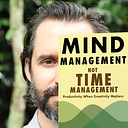You apparently didn’t read the article, but okay, I’ll answer anyway.
In the article I share my own experience. That is how I know that “free content” is not good. I make no sweeping judgements for or about anyone else.
I’m sure you’re aware your racism comparison is a stretch. There’s no plausible mechanism that would cause the color of a person’s skin to dictate whether or not they were nice. Not one I can think of anyway. Or maybe this comparison isn’t a stretch to you and you know of some ways that I’m unaware of?
But there is a plausible mechanism that would deteriorate the quality of information that is produced for free. That’s basic economic incentives. When a company’s financial performance depends upon ad dollars, and ad dollars depend upon eyeballs, that incentivizes the company and everyone writing for it to maximize eyeballs. Maximizing eyeballs optimizes for provocative, misleading, or even false content. Even some “respectable” newspapers pay their journalists by the page view.
Is there some good free content on the web? Of course there is – I never said there wasn’t. But that content tends to be produced out of goodwill, and is not economically sustainable on a large scale, especially when a company has a duty to shareholders.
